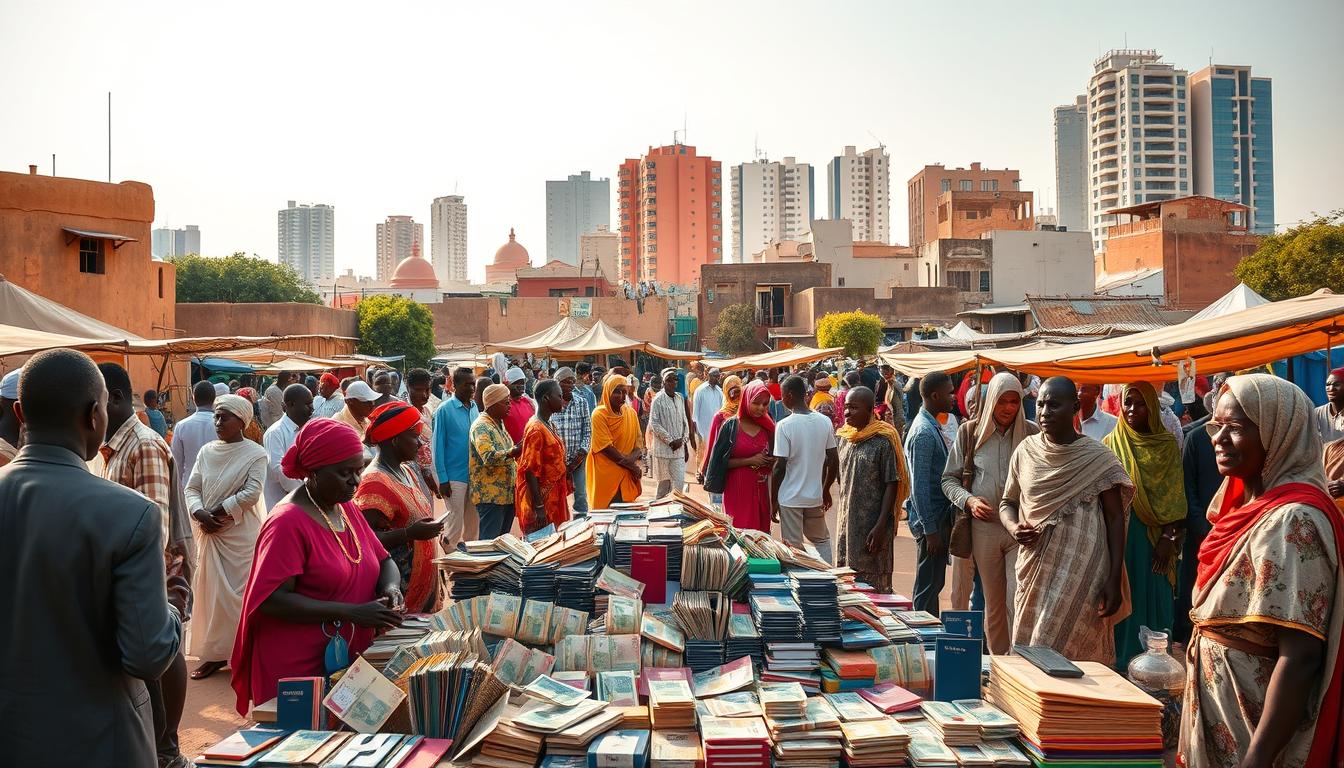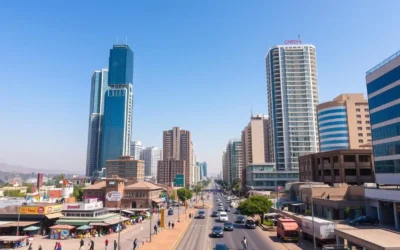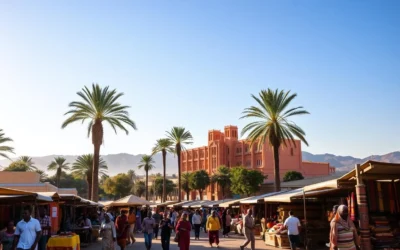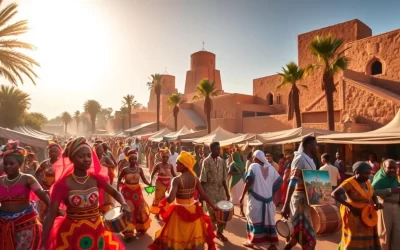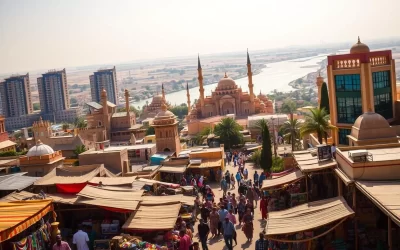✓ Accommodations✓ Flights✓ Rental Cars✓ Tours & Activities
Did you know that Chad, a landlocked country in Central Africa, spans over 1.2 million square kilometers? This vast area is home to diverse cultures and stunning landscapes, making it a unique destination for adventurous travelers. However, navigating its financial landscape requires careful planning.
Understanding the local currency and payment methods is crucial. While cash is widely used, especially in rural areas, card payments are becoming more common in urban centers. Being prepared with both options ensures a smoother experience.
This guide aims to equip you with practical tips for managing your finances effectively. From currency exchange to banking services, you’ll gain insights to make your journey enjoyable and stress-free. Let’s dive into the essentials of financial preparedness for your adventure.
Introduction to Chad’s Travel and Financial Landscape
Before exploring Chad, it’s essential to understand its travel advisories and safety concerns. Government travel advisories provide critical information about restrictions near borders and specific regions. Staying updated ensures your itinerary aligns with the latest guidelines.
Checking updated safety guidelines is crucial before visiting any town in the country. Conditions can change rapidly, and being informed helps you avoid high-risk areas. Monitoring local time schedules and day-to-day rate changes in travel conditions is equally important.
Safety concerns in Chad are significant, especially in remote areas. Taking precautions like avoiding travel at night and staying in well-known towns can reduce risks. Always keep emergency contacts handy and stay aware of your surroundings.
Managing finances in a high-risk environment requires extra care. Being informed about safety concerns helps you plan your trip more securely. This includes understanding local payment methods and keeping cash accessible for emergencies.
By staying updated on travel advisories and safety guidelines, you can navigate Chad’s travel landscape with confidence. This preparation ensures a smoother and more enjoyable journey.
Navigating the Central African CFA Franc
The Central African CFA franc is the official currency used in Chad and neighboring countries. It’s essential to understand its features and how it impacts your travel experience. This currency is divided into 100 centimes and is widely accepted across the region.
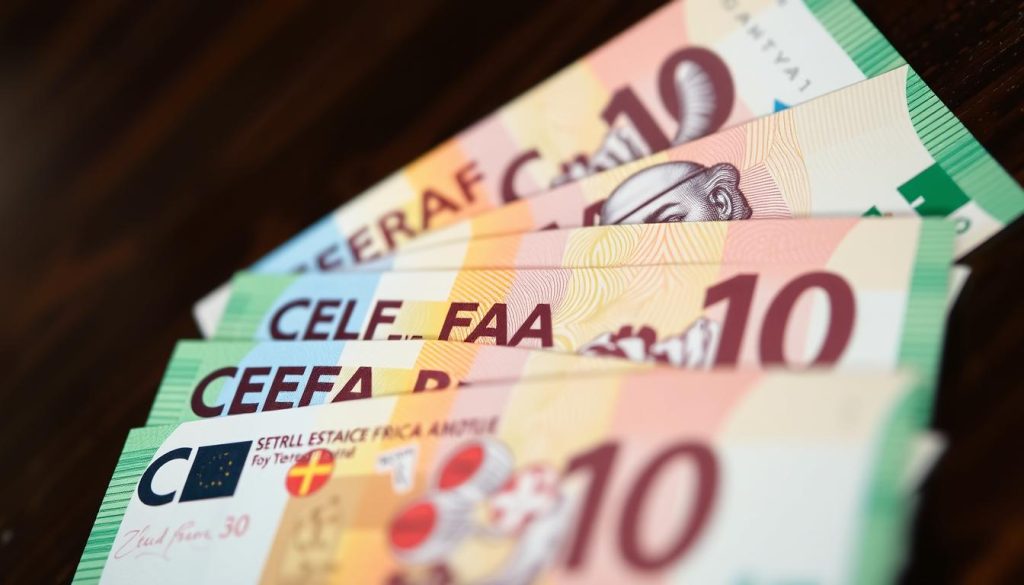
Key Features of the Currency
The Central African CFA franc is distinct from the West African CFA franc, used in other countries. It’s pegged to the Euro, ensuring stability in its value. This makes it easier to plan your expenses when visiting restaurants, hotels, or local markets.
Carrying small denominations is helpful for everyday transactions. Many vendors may not have change for larger bills, especially in rural areas. Keeping coins and smaller notes ensures you’re prepared for tipping or small purchases.
Currency Conversion and Exchange Tips
Converting your money to the local currency is a straightforward process. Here’s a simple guide to help you:
- Exchange a small amount of cash upon arrival for immediate needs like transport or meals.
- Use banks or authorized exchange services for better rates and reliability.
- Monitor exchange rates before your trip to get the best value for your money.
When visiting a restaurant or hotel, cash is often preferred, especially outside urban areas. However, card payments are becoming more common in cities. Planning ahead ensures you have the right way to pay for your expenses.
Understanding the currency and how to manage it will make your trip smoother. By following these tips, you’ll be well-prepared to handle financial transactions during your journey.
Optimizing Cash and Card Usage in Chad
Managing your finances effectively in Chad requires a strategic approach to cash and card usage. The country’s diverse regions demand different payment methods, and understanding this balance can make your trip smoother and more enjoyable.
In rural areas, cash is king. Many small vendors, local markets, and food stalls only accept physical currency. Carrying smaller denominations is especially helpful for everyday transactions. This ensures you’re prepared for tipping or small purchases where change might be scarce.
Urban centers, on the other hand, are increasingly adopting card payments. Restaurants, hotels, and larger stores in cities often accept credit or debit cards. However, it’s still wise to keep some cash on hand for places that haven’t transitioned to digital payments.
When to Use Cash
Cash is essential in less-developed regions where card services are unavailable. Local markets, transportation, and small eateries typically rely on cash transactions. Planning your cash withdrawals in advance ensures you’re never caught off guard.
Here’s a quick guide to balancing cash and card usage:
| Region | Preferred Payment Method | Tips |
|---|---|---|
| Rural Areas | Cash | Carry small denominations for convenience. |
| Urban Centers | Cards | Keep some cash for emergencies. |
By planning ahead and understanding the payment landscape, you can optimize your finances for a stress-free journey. Whether you’re exploring bustling cities or remote villages, being prepared ensures you’re ready for any situation.
Planning Your Financial Strategy for Chad
A well-thought-out financial strategy ensures a smoother travel experience. Managing your budget effectively is crucial, especially when navigating local conditions and seasonal changes. Here’s how to plan wisely for your journey.

Budgeting for Local Transactions
Start by estimating daily expenses for meals, transport, and activities. In rural areas, cash is often the only option, so allocate funds accordingly. Urban centers may accept cards, but it’s wise to keep cash for emergencies.
Seasonal variations, like the rainy season, can affect transportation costs and accessibility. Plan for potential delays or higher prices during these times. This ensures you’re prepared for any situation.
Don’t forget to include small expenses in your budget. Tips, snacks, and local souvenirs are often overlooked but can add up quickly. Allocating funds for these ensures you stay within your financial limits.
Preparing for Unexpected Expenses
Set aside extra money for emergencies. Remote areas may have limited access to water or food, so having reserves is essential. This also covers unexpected costs like medical needs or transportation changes.
Here’s a quick checklist to help you plan:
- Estimate daily expenses and add a buffer for flexibility.
- Account for seasonal changes that may impact your spending.
- Allocate funds for small, everyday transactions.
- Set aside emergency funds for unexpected situations.
By following these steps, you’ll create a sustainable and realistic financial strategy. This preparation ensures you’re ready to handle any part of your journey with confidence.
Chad: Ultimate Travelers Guide to Currencies & Payments
Understanding payment methods in Chad can make your trip smoother and more enjoyable. The country’s financial landscape varies significantly between bustling cities and remote villages. Knowing what to expect ensures you’re prepared for any situation.
Payment Methods in Urban vs Rural Areas
In urban centers like N’Djamena, card payments are becoming more common. Major hotels and restaurants often accept credit or debit cards. However, it’s still wise to carry cash for smaller establishments or emergencies.
Rural areas, on the other hand, rely heavily on cash. Local markets, transportation, and small vendors typically don’t accept cards. Carrying smaller denominations is essential, as change can be hard to come by.
Pre-Trip Currency Exchange Tips
Exchanging currency before your trip can save you time and money. Securing a favorable rate at home ensures you’re ready for immediate expenses like transport or meals. Use banks or authorized exchange services for reliability.
Here are some practical tips for currency exchange:
- Monitor exchange rates before your trip to get the best value.
- Exchange a small amount of cash for initial needs upon arrival.
- Keep some foreign currency for emergencies or unexpected costs.
Using ATMs and Banking Services
ATMs are rare outside major cities, so plan accordingly. In urban areas, Ecobank ATMs are available for cash withdrawals with Mastercard or Visa. Always notify your bank of your travel plans to avoid card issues.
Banking services in Chad are limited, especially in rural regions. Locals often rely on informal networks for financial transactions. Tourists, however, should stick to established services for security and convenience.
Choosing the Right Place and Service
Selecting the right place for financial transactions is crucial. In cities, banks and ATMs are your best options. In rural areas, cash is king, so plan your withdrawals in advance.
Different types of persons, like locals and tourists, experience payment options uniquely. Locals are accustomed to cash-based systems, while tourists may find card payments more convenient in urban centers.
Practical Tips for Smooth Transactions
Here are some final tips to ensure a hassle-free financial experience:
- Carry a mix of cash and cards for flexibility.
- Keep small denominations for everyday transactions.
- Stay informed about local payment customs and practices.
By understanding these differences and planning ahead, you’ll navigate Chad’s financial landscape with ease.
Accessing Banking Services and ATMs in Chad
Navigating banking services in Chad requires careful planning and awareness of local conditions. The availability of ATMs and banking facilities varies significantly between urban and rural areas. Being prepared ensures you can manage your finances smoothly throughout your journey.
Locating ATMs in Major Cities
In cities like N’Djamena, ATMs are more accessible but still limited. Major banks such as Ecobank and Société Générale offer reliable services. Always notify your bank about your travel plans to avoid issues with your credit or debit cards.
Here are some tips for finding ATMs:
- Look for ATMs in well-secured areas like shopping centers or hotels.
- Carry backup cash in case machines are out of service.
- Use ATMs during daylight hours for added safety.
Understanding Local Banking Hours
Banking hours in Chad are typically from 8:00 AM to 3:30 PM, Monday to Friday. Some banks may close earlier, so plan your transactions accordingly. Arriving early ensures you have enough time to complete your requirements.
Keep in mind that rural areas may have even more limited hours. Always confirm the schedule of your chosen bank branch to avoid inconvenience.
Meeting visa and other financial requirements before your arrival is crucial. This includes ensuring your documents are in order and understanding any restrictions on currency import or export. Proper preparation helps you avoid last-minute issues.
By planning ahead and understanding the banking landscape, you can make the most of your tour without unnecessary stress. Whether you’re in a bustling city or a remote village, being informed ensures you’re ready for any financial situation.
Tips for Safe Transactions while Traveling in Chad
Traveling safely in Chad involves more than just packing the right gear—it’s about protecting your finances. Fraud and unauthorized access to your money or credit card details can turn a dream trip into a nightmare. Here’s how to stay secure.
Preventing Fraud and Unauthorized Access
Fraud schemes are common in unfamiliar regions. Scammers may target tourists through fake ATMs or phishing attempts. Always use ATMs inside banks or hotels, and avoid street machines. Here’s a tip: notify your bank about your travel plans to prevent any card blocks due to suspicious activity.
Another effective strategy is to monitor your transactions regularly. Instant notifications through banking apps can alert you to unauthorized charges. If you notice anything unusual, report it immediately to your bank.
Practical Tips for Securing Your Finances
Here are some actionable steps to keep your money and information safe:
- Carry a mix of cash and cards. Use cash for small transactions and cards for larger purchases.
- Keep your credit card details private. Avoid sharing them over unsecured networks or with strangers.
- Store your cash and cards in separate places. This minimizes losses in case of theft.
- Use a money belt or hotel safe to secure your valuables.
Checklist for Preventing Fraud
Before and during your trip, follow this checklist to ensure financial security:
| Step | Action |
|---|---|
| Before Travel | Notify your bank, exchange currency, and set up transaction alerts. |
| During Travel | Use ATMs in secure locations, monitor transactions, and avoid sharing financial details. |
| After Travel | Review bank statements and report any suspicious activity. |
By following these tips, you can protect your money and enjoy a worry-free journey. Remember, preparation is the key to financial safety while traveling.
Integrating Local Payment Customs and Etiquette
Understanding local payment customs can greatly enhance your travel experience. Respecting these practices not only ensures smooth transactions but also shows appreciation for the culture. It’s a good idea to learn the basics before you arrive.
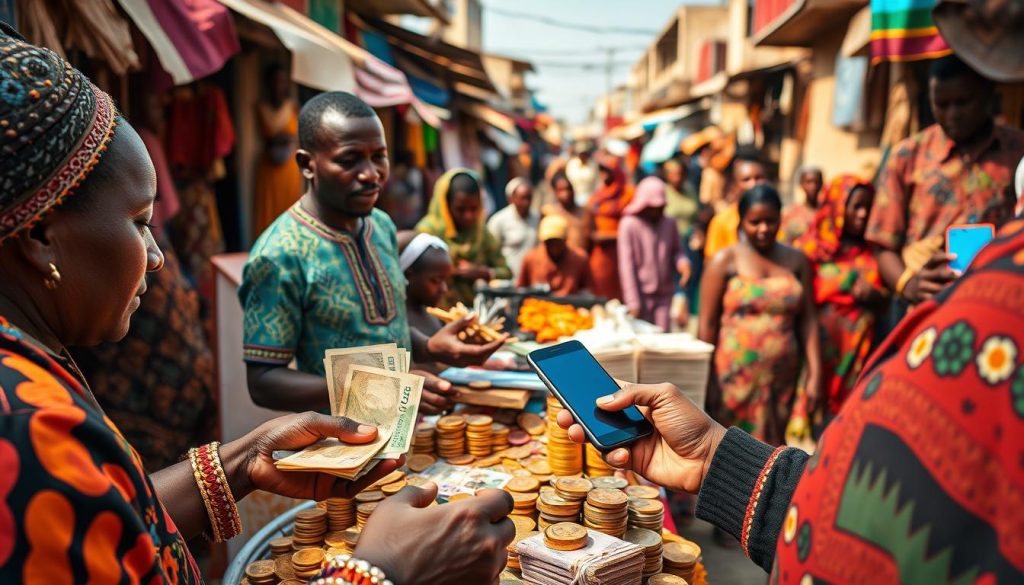
Respecting Local Practices at Markets and Vendors
When shopping at local markets, using your hand appropriately is crucial. In many cultures, the way you handle money or goods reflects respect. For example, offering cash with your right hand is often considered polite.
Here are some tips for respectful interactions:
- Always greet the vendor before starting a transaction. A simple hello can go a long way.
- Negotiate prices politely. Haggling is common, but it’s important to remain courteous.
- Use small denominations of cash. This makes it easier for vendors to provide change.
Choosing the best option for payment methods is also key. In rural areas, cash is often the only option, while urban centers may accept cards. Being prepared with both ensures you’re ready for any situation.
Safety is another important factor. Keep your money secure and avoid displaying large amounts of cash in public. This minimizes the risk of theft and ensures a smoother experience.
“Respecting local customs is not just about following rules—it’s about building connections.”
By observing these practices, you’ll integrate more seamlessly into the community. Whether you’re at a bustling market or a small vendor, showing respect fosters positive interactions and enriches your journey.
Handling Emergency Financial Situations Abroad
Traveling abroad can bring unexpected financial challenges, and being prepared is key to handling them effectively. Whether you’re in a bustling city or a remote village, having a plan ensures you’re ready for any situation.
Managing Unexpected Expenses
Unexpected expenses can arise at any hour, from medical emergencies to transportation delays. To manage these, set aside a portion of your budget as an emergency fund. This ensures you’re covered without disrupting your travel plans.
Consider using prepaid cards or travel insurance to mitigate costs. These options provide financial flexibility and peace of mind, especially in unfamiliar regions. Always keep a small amount of cash on hand for immediate needs.
Keeping Emergency Funds Accessible
Accessibility is crucial when dealing with emergencies. Store your emergency funds in multiple places, such as a money belt, hotel safe, or secure digital wallet. This ensures you’re prepared no matter the situation.
Here are some tips to keep your funds accessible:
- Carry a mix of cash and cards for flexibility.
- Use ATMs in secure locations during daylight hours.
- Notify your bank about your travel plans to avoid card issues.
Procedures for Financial Difficulties
If you encounter financial difficulties, act quickly. Contact your bank or card issuer to report any issues. Many banks offer 24/7 support for travelers, ensuring help is available at any hour.
Reach out to local authorities or your embassy for assistance. They can provide guidance on accessing international aid or resolving financial disputes. Having emergency contact numbers saved on your phone is a smart move.
Importance of a Contingency Plan
Every tourist should have a contingency plan. This includes setting up multiple lines of communication, such as email, phone, and messaging apps. Share your travel itinerary with a trusted friend or family member for added security.
By planning ahead and staying informed, you can navigate any financial challenge with confidence. Remember, preparation is the key to a worry-free journey in any part of the world.
Technology, Mobile Payments, and Financial Apps
The rise of mobile payment apps is transforming how travelers manage their finances in Chad. These modern solutions offer convenience and efficiency, especially in areas where traditional banking is limited. By embracing digital tools, you can simplify your financial transactions and focus more on enjoying your journey.
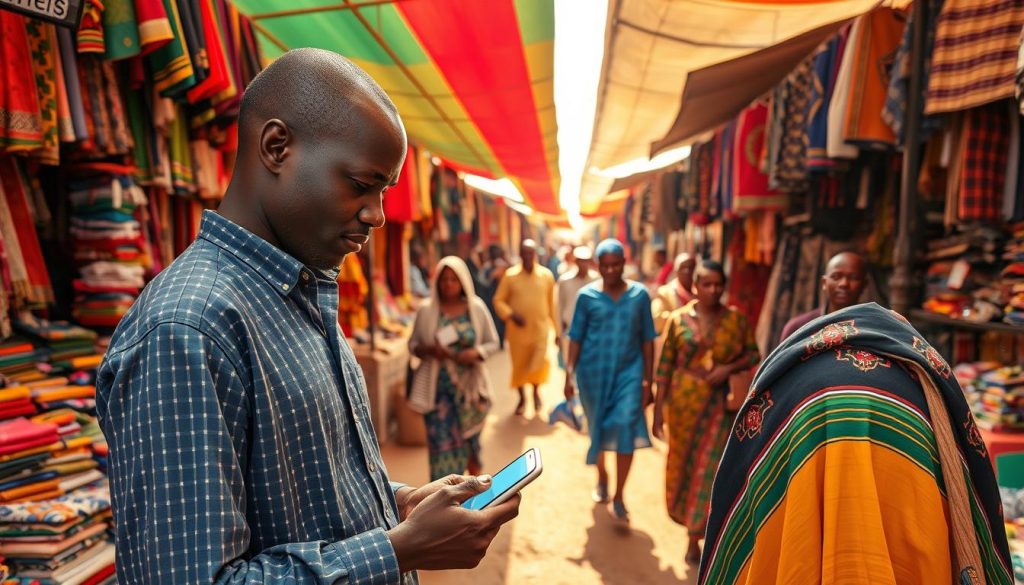
Benefits of Digital Payment Methods
Digital payment methods provide a mix of flexibility and security. They allow you to handle transactions quickly, whether you’re booking an activity or paying for accommodation. This reduces the need to carry large amounts of cash, which can be risky in unfamiliar areas.
Here are some key advantages of using mobile financial apps:
- Instant transactions for seamless payments.
- Secure encryption to protect your financial data.
- Easy tracking of expenses for better budgeting.
Choosing the right app can make a big difference. Look for platforms that are widely accepted and offer features like currency conversion. This ensures you’re prepared for any financial activity during your trip.
“Mobile payments are not just a trend—they’re a game-changer for travelers seeking convenience and security.”
Simplifying Activity and Accommodation Payments
Digital tools can streamline the process of booking tours, hotels, and other services. Many apps allow you to reserve and pay for accommodation in advance, saving you time and effort. This is particularly useful in remote areas where cash may be the only alternative.
Here’s a comparison of traditional and digital payment methods:
| Payment Method | Pros | Cons |
|---|---|---|
| Cash | Widely accepted, no need for technology. | Risk of theft, limited for large transactions. |
| Mobile Apps | Secure, convenient, and fast. | Requires internet access and compatible devices. |
Exploring innovative payment solutions is a smart idea. It not only enhances your travel experience but also prepares you for future trips. By integrating digital tools into your financial strategy, you can enjoy a smoother and more enjoyable journey.
Conclusion
Being prepared financially can make all the difference when exploring new destinations. This guide has highlighted essential tips for managing your money, from understanding local currencies to balancing cash and digital payments. Planning ahead ensures you’re ready for any emergency, whether it’s unexpected expenses or challenges with transportation.
Respecting local customs not only smooths transactions but also enriches your travel experience. Whether you’re navigating bustling markets or traveling at night, showing cultural awareness fosters positive interactions. Remember, a well-prepared budget and contingency plan are your best tools for a safe and enjoyable journey.
Take a moment to review your travel plans and update them with the insights from this guide. By staying informed and prepared, you can focus on making unforgettable memories while exploring new horizons.
The above is subject to change.
Check back often to TRAVEL.COM for the latest travel tips and deals.
